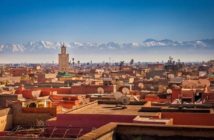GADLING
Posted by Candace Rose Rardon

“A single act of kindness throws out roots in all directions,and the roots spring up and make new trees.”– Amelia Earhart
Roses aren’t supposed to let you down.
Neither are rose festivals, one of which had drawn my friend Liz and me to Morocco’s Valley of Roses this May. There wasn’t much written online about the festival, but what the guidebooks and websites lacked in details, my mind more than made up for in expectations.
Liz met me in Tangier’s Gare Tanger Ville station, where we bought tickets for our overnight train to Marrakech, stretched out our nearly 6-foot frames across pumpkin-colored leather couchettes, and woke to fields separated by prickly pear cacti, a lone figure picking handfuls of grass at dawn. We were in Marrakech long enough to catch a bus 300 kilometers east to Kelaat M’Gouna, what we assumed, or rather hoped, was a small village, its dusty air perhaps sweetened by the presence of roses.
The train had taken eleven hours, the bus would be six, but what propelled us, urging us ever forward, were our expectations of the festival, an annual celebration to mark the rose harvest each spring.
We carry so much with us when we travel, much more than the neatly (or not so neatly) folded items in our suitcases. But the most dangerous thing we bring, tucked in between regulation-size shampoo bottles and extra pairs of socks, is expectation. The moment we begin to envision a new place, to believe how it will be, is the moment that same place begins to fail us.
In the title poem from her collection, “Questions of Travel,” Elizabeth Bishop writes, “Think of the long trip home. Should we have stayed at home and thought of here? Where should we be today?… Oh, must we dream our dreams and have them, too?” Bishop perfectly captures the traveler’s dilemma: do we risk disappointment and failed expectations for the reality of somewhere different? Or would it not be better to leave our visions intact and live through imagination – not actual experience?
Gallery: Valley of Roses, Morocco
Such questions hovered uneasily in my mind as we set out from our guesthouse the first day of the festival. Crowds led us to a large amphitheater whose ring of concrete seats stretched several rows up. By ten in the morning, it was packed with flocks of young men perched on the top row, Berber women in their layers of crushed velvet and sequined chiffon, and men in colorful turbans and long white robes. Ice cream sellers hung coolers from around their necks, calling out “Hemeem, hemeem” in high-pitched voices, the rose-flavored cream already dripping from children’s chins and dancing down their arms like drops of rain on a window.
But there was no pageant this year as we’d read there would be, which meant no rose queen would be chosen either; all the handicrafts in the local market read “Made in China”; and the only roses we had yet to find were tightly furled buds that had been pierced by a needle, strung together in the shape of a heart and then hawked to tourists. Even Kelaat M’Gouna was far from the village we’d expected, its streets as clogged with festivalgoers and as difficult to navigate as any other big city. Liz and I shifted from the amphitheater to the market and back again, both of us filling the space with chitchat, forever avoiding one word: disappointment.
“Let’s go for a walk,” Liz said. I suggested the city gate as a destination. We’d passed it on the bus ride in, two sets of imposing square pillars on either side of the road painted a bright blush pink, but I hadn’t been quick enough with my camera to get a shot of it. Now was my chance.
We left the festival behind, the tinny sounds of CD sellers’ portable stereos slowly evaporating, the sun nearing its zenith above our heads. To our left, just beyond the town limits, dry, ochre hills rose away from us, appearing almost lunar with barely a few shrubs to break up the striated stone. To our right flowed the M’Goun River, feeding a lush riverbed of wheat fields, groves of olive, fig and almond streets, and, finally, endless hedges of rose bushes. For the first time all day, our steps leading us ever closer to the gate, I felt a sense of purpose for being here.
And that’s when I saw her. It was her dress that caught my eye first – the shade of blue I’ve always loved to call pavonine, after a vocab word from the sixth grade: of or resembling the feathers of a peacock, as in coloring. Although she was sitting in the shade of a billowing almond tree, perhaps twenty feet below the road in the sunken riverbed, she still shimmered, a few stray rays of sunlight dancing off the silky fabric that enclosed her.
She waved, as did the woman sitting next to her, a wave that soon became a beckoning, come-hither kind of gesture.
“Do you think she means us?” I asked Liz.
“Who else could it be?”
Liz was off before I had time to think, exchanging road for scrubby hillside, leaping with her long legs over a crevice in the ground. Tentatively, I followed suit and raced to catch up with her, curious about where this unexpected invitation might lead. We bowed our heads slightly beneath the low-hanging branches of the almond tree and joined them. The woman who’d waved first, the woman in pavonine blue, was named Hazo; the other was Arkaya, who was mysteriously introduced as Hazo’s grandmother’s sister, despite how close in age they appeared. They motioned for us to sit beside them on a few tattered blankets.
With her back resting against the tree, Arkaya sliced chunks of turnips, cauliflower, potatoes and onions onto her lap; Hazo sat across from us, bringing a metal pot to boil on a single gas burner and slipping in shards of sugar as large and pointed as daggers. She poured tea for all of us, teaching Liz and me how to say it in Berber – até – but no matter how it was pronounced, tea had never tasted so sweet.
For the rest of the afternoon, we hardly moved from their sides. Their sons came later, as did Hazo’s husband, a civil servant in a village 100 kilometers away. There were more introductions, more glasses of tea and more Berber lessons.Emklee for lunch, harlti for auntie, and – my favorite – zuin. Beautiful. We tried to leave before lunch, hesitant to overstay our welcome, but the idea was quickly dismissed. After the vegetables had simmered long enough with thick pieces of lamb, the air fragrant with saffron, they were served in a single bowl in the middle of the blanket. Arkaya ripped bread into pieces, and we circled around the food, our shoulders pressing together.
“Tch, tch!” Hazo said. Eat, eat!
“Eat the meat!” her husband insisted, chiding us when we drifted too far from the dish.
I lost track of how many times I said zuinabout the meal.
When the last drop of juice had been soaked into bread, the blankets were cleared and Hazo and Arkaya lay down. Arkaya rested her head on Hazo’s bent knees, and then motioned for me to do the same on hers. My eyes were closed and the breeze was soft, but I found comfort in more than our human nap chain; I was filled with the warmth of their kindness, with a hospitality I hadn’t expected. I wondered when I would learn not to let my expectations get the best of me – and when I would remember that the most cherished memories from a place are so often the ones we didn’t know to expect. We said goodbye, and Liz and I once again began making our way to the city gate.
Roses aren’t supposed to let you down. And beneath an almond tree one afternoon in the Valley of Roses, they didn’t.
Candace Rose Rardon is a travel writer, photographer, and sketch artist with a passion for documenting the world. She recently completed a Masters in Travel Writing from London’s Kingston University and is currently living in India. Visit her website athttp://www.candaceroserardon.com/. “Beneath the Almond Tree: A Moroccan Memory” won First Prize in the 2012 Book Passage Travel Writers & Photographers Conference writing competition.
Tags: africa, food, morocco
.






